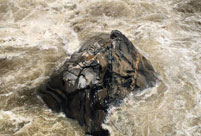 China Southern Airlines flight attendants win titles in service contest
China Southern Airlines flight attendants win titles in service contest
 Pupil's performance art persuades people to stop smoking
Pupil's performance art persuades people to stop smoking
 Nie Chenxi's clay tigers
Nie Chenxi's clay tigers
 Children's Day wishes
Children's Day wishes
 Chinese Kung Fu charms Silicon Valley
Chinese Kung Fu charms Silicon Valley
 Tranquil Yankou ancient town
Tranquil Yankou ancient town
 Lake Geneva: A show of swans
Lake Geneva: A show of swans
 Beautiful sunset over the Irtysh River
Beautiful sunset over the Irtysh River
 Qingjing Mosque: Witness of the ancient Maritime Silk Road
Qingjing Mosque: Witness of the ancient Maritime Silk Road
 Neiliansheng – more than 100 years of fashion
Neiliansheng – more than 100 years of fashion
BEIJING, June 5 -- Japanese Prime Minister Shinzo Abe must feel disappointed now.
The Group of Seven (G7) summit on Wednesday wisely stopped short of taking a pro-Japan stand over the East China Sea issue, dealing a blow to Japanese officials and media that have been trying to sell an anti-China agenda in the runup to the meeting.
A communique issued after the first day of the two-day summit in Brussels only read that the G7 opposes "any unilateral attempt by any party to assert its territorial or maritime claims through the use of intimidation, coercion or force."
The statement did not mention any specific country, not to mention China.
Japanese officials, including Abe, might believe this amounted to a veiled warning to China, but such a measured statement could serve as a reminder to right-leaning Japan too.
Given Japan's hawkish foreign policies and its unrepentant attitude towards history, it is delusional to think the G7, which consists of the United States, Canada, Britain, France, Germany, Italy and Japan, would take a unified anti-China stand.
Many of the G7 members, particularly Germany, France and Britain, have important bilateral relations with China, which makes it impossible for them to pull Japan's chestnuts out of the fire.
After all, given the G7's waning global influence and its ongoing confrontation with Russia over the Ukraine crisis, it is not like the group's words on the South and East China issues will make much difference.
The real top issue at the G7 summit is still the Ukraine crisis. If Abe counts on other Western leaders to form an anti-China alliance at the meeting, he is destined to be disappointed.
Any wise Western policy-makers will not act the fool to decide to jointly contain China as they clearly know this will only harm their own national interests.
Besides, it is not China that has provoked tensions in East Asia. The China-Japan dispute over the Diaoyu Islands drastically worsened only after Japan moved to change the status quo by "nationalizing" some of the islands.
For China, such a move is completely unacceptable because it not only betrayed an unwritten agreement between the two countries to shelve the issue for future generations to solve, but also amounts to a unilateral and substantial plan to snatching the islands from China.
If the G7 really wants to do some good to Asia, they should be cautious about Japan's nationalist ambitions and work to restrain its dangerous adventurist policies.
 Magnificent Hutiao Gorge
Magnificent Hutiao Gorge  Heat waves hit China
Heat waves hit China Love at the construction site
Love at the construction site Graduation photos bring memories back to life
Graduation photos bring memories back to life Art school students present works in Nanjing
Art school students present works in Nanjing Opening ceremony of 67th Cannes Film Festival
Opening ceremony of 67th Cannes Film Festival Pulse of Xiamen - Int'l Yoga art festival in May
Pulse of Xiamen - Int'l Yoga art festival in May Photo story: Life of a scrap metal recycle worker
Photo story: Life of a scrap metal recycle worker Training of the PLA's first female honor guard
Training of the PLA's first female honor guard Dali, an ideal summer vacation destination
Dali, an ideal summer vacation destination Xichan Temple's little monk hit the Internet
Xichan Temple's little monk hit the Internet Monologue of a modern dancer
Monologue of a modern dancer College girl proposes to boyfriend on Weibo
College girl proposes to boyfriend on Weibo Special operation members in counter-terrorism training
Special operation members in counter-terrorism training American football brings manhood out of boys
American football brings manhood out of boysDay|Week|Month